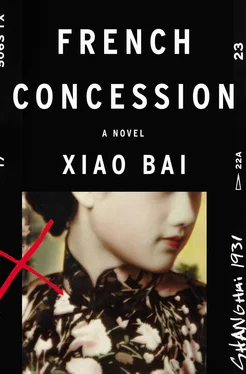“I know, she’s called Leng Hsiao-man.”
Hsueh turned and walked quickly down the stairs.
MAY 25, YEAR 20 OF THE REPUBLIC.
10:50 A.M.

As Hsueh walked along, he could not stop thinking about that woman. She looked like someone he knew, but he still didn’t know who she was. All the movies he had seen starred Western actresses. Maybe it was a certain expression, a scene, a line of dialogue she reminded him of. He hadn’t even spoken to her. Now that her photo had been in all the papers, he could barely tell whether the face he imagined was the one he had seen by the railing.
On Mohawk Road, someone thumped him on the shoulder. His shoulder strap slipped, and he quickly hooked his arm to catch his camera. It was Barker.
Barker was American. He had fat fingers covered with layers of skin that made them look like Cantonese sausages, and his fingernails were dull.
“Acetic acid,” Barker had told him one day in the bar.
He had spread his hands, palms facing downward, on the little round table in the bar. The tablecloth was stained with tea, as if he had just rubbed his hands on it. You could invent an alias or grow a beard, but you could not swap out your fingertips. The police had a new way of dipping your fingers in ink and pressing them on a piece of paper, which would go in a big book in a filing cabinet. Then you would never be able to get in trouble again — the cops would find you wherever you went. It’s not as though you could cut off your fingers. Soaking them in vinegar worked and didn’t hurt, but it took a couple of weeks. When Barker was telling him all this in the bar, they had known each other for only about a month.
Hsueh had met him at the roulette table in the saloon. When gambling was outlawed in the International Settlement, all the dice joints and gambling dens had migrated to the narrow alleyways of the French Concession, but foreigners hardly ever came to this kind of place. Barker hovered by the tables, tall and lanky with long arms like a mantis. He stuck out. Hsueh made a point of being inquisitive in the Concession, which he considered his territory. He kept tabs on anyone who stuck out.
A wanted man in America who had fled across the Pacific, Barker now stood in the saloon with the air of a diplomat fresh off the ships. His right elbow was cupped in his left hand, and he was ostentatiously tapping his forehead with his right index finger, like a British public school boy.
Barker pulled Hsueh into the Race Course. Word was that the final steeplechase had been fixed, said Barker, and the horse owner himself was said to be betting against the Cossack jockeys. The jockeys had decided to trap Chinese Warrior between two other horses to prevent it from reaching full speed, and Black Cacique, a literal dark horse, would win. The crowds crammed between the iron gates and the viewing deck were hysterical, as if the Lord himself had decided not to wait for Judgment Day and was judging the saved from the damned on the basis of their betting slips.
A whistle blasted, and the loudspeakers on either side of the viewing deck began to crackle. Someone was making an announcement in English followed by Shanghainese dialect: “The Race Club Committee hereby announces the hosting of an additional steeplechase race this afternoon.”
Cheering, the crowd rushed toward the viewing deck. In the frenzy, a single cry could create a maelstrom that would suck the whole crowd in.
Hsueh changed his mind abruptly. He did not want to join them after all. He bid farewell to Barker, and walked toward Avenue Édouard VII. He would lunch at the Manor Inn, and later that afternoon, Therese would be waiting for him at the Astor Hotel, in a fourth-floor luxury suite that cost twelve yuan a day.
Hsueh was the illegitimate son of a Frenchman who had boarded a boat in Marseille with a suitcase full of tattered clothes. The Frenchman had loitered in bars in Saigon and Canton, bragging about his exploits, until he found a job in Shanghai. It was the best time of his life. Hsueh’s Cantonese mother had a dull complexion. She wore a traditional jacket with dull patterns, her curls jabbing into its stiff collar. She had never worn clothes like that before meeting Hsueh’s father, and she then refused to wear anything else. She rattled constantly around Hsueh’s pale collarbone, in an egg-shaped cloisonné box that he wore on a heavy silver chain around his neck. The chain had long been stained black with his sweat. Even when he was at his least self-conscious, whispering dirty phrases in Therese’s ear in Chinese she didn’t understand, his mother was still rattling between their bodies.
Moved by a passion he had never experienced until then, Hsueh’s father rushed to the trenches at Verdun during the Great War, leaving behind in Shanghai all his possessions, his Chinese lover, and Hsueh. He never returned. Hsueh was only twelve years old. But it could not be said of Hsueh’s father that he did not love his family. He wrote to them from the battlefield, and the letters that reached them from across the oceans often contained a small package of photographs. In one of them, a Zulu regiment was performing a religious ceremony. Hsueh’s father had never seen that many black men in his life. Wearing nothing but a piece of cloth around their waists, they waved their sticks, dancing with rapt expressions. Hsueh’s favorite one was of his father smoking a pipe in the trenches in summertime, his chin covered with stubble, shirtsleeves torn short at the shoulders. In another photo, a man posed stark naked at the entrance to the shower cubicles while his uniform hung on the wall. It was his father, grinning at the camera with one hand covering his pubic hair. His mother had stashed this photo away, so he did not see it until after her death. There was a line in French on the back: Poux — Je n’ai pas de poux! Lice — I have no lice! He suspected this photo was partly responsible for the fact that his mother never remarried.
That winter, his father posed for a photo next to a row of corpses. He wore his jacket and a water canteen slung over his shoulder. There were so many corpses that it looked like a slaughterhouse. Some were laid out side by side, while others were piled on trucks like garbage. In fact, the injured looked even more horrific than the dead. One man was wrapped from head to toe in bandages, excepting three holes for his eyes and nose.
Not only had his father’s amateur photography influenced Hsueh’s choice of career, but the very photos that he sent them from the trenches were also an artistic inheritance that had shaped Hsueh’s tastes. Hsueh’s penchant for snapping photos of dead men, crime scenes, maimed, stabbed, and bullet-ridden bodies, frenzied gamblers, drunkards, and all forms of human perversity could likely be traced to the photos his father sent home.
When she died, Hsueh’s mother had left him a small sum of money, most of which he spent within a month. He had an American firm on the Bund order a camera from New York for him, a 4x5 Speed Graphic with a 1/1000s Compur shutter, the best press camera to be had. It could capture the instant before a bullet pierced a human skull.
Before he met Therese, photography had been his greatest love, with gambling only a distant second. Then Therese had nearly replaced photography in his affections until he tried combining his two loves and found that they were both the better for it.
He had fallen for her right away, that night in Lily Bar.
“Half a glass of kvass topped off with vodka. Hey you, Duke! You know what I want.” She had been a little tipsy. Duke, the waiter she was shouting for, was the White Russian owner of the bar.
Читать дальше













